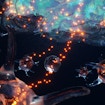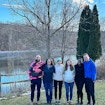
Taking Care of Each Other, With Science and Solidarity
One evening early in the pandemic, Dr. Mónica Feliú-Mójer got a call from her mother-in-law.
As the director of communications for Ciencia Puerto Rico, Feliú-Mójer had spent all week fielding questions about COVID-19. It had been an especially long day. Now, her mother-in-law was on the phone with the same questions she’d been answering over and over. Tired, she started wondering if there was a better way.
“I turned to my husband and said, ‘I’m going to create a toolkit with this information to send to community leaders and educators, so that they can help their communities’,” she says.
And that’s exactly what she did. Aquí Nos Cuidamos, translation: “here we take care of ourselves,” is a free multimedia Spanish-language toolkit by CienciaPR for COVID-19 prevention in Puerto Rico. The project started in September 2020 and released its first digital toolkit in February 2021.
“We want to put science in service of these communities,” says Feliú-Mójer. “We see it as a model to build the capacity and agency of marginalized communities to use science to address challenges that they face.”
According to CiencaPR, the government and department of health have had a poor track record of equitably meeting community needs during the pandemic. Mixed messaging has made it difficult to know where to turn.
To build trust, Aquí Nos Cuidamos focuses on the community level and encourages people to take ownership of prevention resources. “We were without governmental leadership, so to some extent it was up to the people to be responsible and to look for ways of providing information to each other,” says Dr. Giovanna Guerrera Medina, the executive director of CienciaPR.
Aquí Nos Cuidamos is built around four public service campaigns: safe socialization, vaccines, mental health (coming June 2021) and science for decision-making (coming August 2021).
Each campaign includes ready-to-use downloadable resources including posters, social media content, infographics, fact sheets, videos and audio. The resources are adaptable for a variety of situations for COVID-19 prevention: educational settings, local businesses and people sharing information with their family and friends.
The first campaign, “physical, not social distance,” focuses on culturally relevant ways to be close to loved ones and also prevent the spread of COVID. “For humans, socially connecting is important, but culturally in Puerto Rico, connecting with loved ones with community members is extremely important. It’s part of who we are,” says Feliú-Mójer.
The team prioritized listening to community needs, starting with two ‘listening sessions’ with leaders of nonprofits and community organizations to understand their questions, concerns and needs related to COVID-19 prevention strategies. Feliú-Mójer and her team also worked with scientists and science communication experts to ensure the content aligned with best practices for public health communication.
Community-focused problem-solving runs deep in Puerto Rican culture. While rebuilding from hurricanes in 2017, “a phrase started being repeated — el Pueblo Salva el pueblo — which means the people save the people, says Dr. Medina. ”It’s the idea that we need to be there for each other because we can’t expect anyone else to save us.”
Another major pillar of Aquí Nos Cuidamos is inclusivity for marginalized communities. “We’ve been incorporating inclusive design and science communication principles to ensure that what we’re doing actually addresses the needs of different communities, and these communities can see themselves in the content,” says Feliú-Mójer.
The team is also paying attention to the Deaf community, which faces a lack of accessible communications and resources. They are working with a sign language interpreter to make sure that the materials were accessible to deaf and hard-of-hearing people and their needs — such as including sign language interpretation in videos and webinars.
Aquí Nos Cuidamos also works with community leaders, the majority of whom are working class women. The Community Ambassadors program chose 10 community leaders from all over Puerto Rico to receive additional training and monetary stipends to implement community projects. “Ultimately what we want them to do is take ownership of the content, so they can adapt it and use it to address their specific community needs,” says Feliú-Mójer.
In addition, the team is getting the word out on social media, especially Facebook and WhatsApp, using the hashtag #AquiNosCuidamosPR. The campaigns’ audio content is broadcast as PSAs on local radio stations, as well as “sound vans” that drive around rural communities broadcasting PSAs. There have also been over 25 written articles and TV and radio interviews covering the project, in both English and Spanish.
Digital literacy poses a large problem, since so much of the program is digital by necessity. Not everyone knows how to use virtual conferencing, register for webinars, and access email. The team is attempting to reach some more “old-school” community leaders by phone to make sure they’re not left out.
Measuring the program’s impact is also complex as only certain things — forum attendance, number of downloads, media mentions, website and social media analytics — can be put into numbers, while a lot of the impact is anecdotal. Surveys and interviews have received overwhelmingly positive feedback about the tone of hope and solidarity and emphasis on Puerto Rican culture.
Still, it’s a complex project, and Feliú-Mójer describes it as, at times, daunting to figure out how to best meet needs.
Ultimately, the long-term goal of Aquí Nos Cuidamos is to build a foundation for public engagement in the future, and community-based solutions to challenges like the climate crisis.
“I’m really excited that we’re getting important information out there on COVID-19,” says Guerrera Medina, “But I’m also very excited that we’re setting up a structure that could benefit other types of science communication topics that we would like to engage our public on.”
Aquí Nos Cuidamos is supported by grants from Science Sandbox and the Emerson Collective Fellowship. Nonprofit partners include Puerto Rico Public Health Trust, Mercy Corps Puerto Rico, the Puerto Rico Psychological Association and Taller Salud.
All Toolkit content is available for free download at aquinoscuidamos.org.
To learn more about Aquí Nos Cuidamos, click here. You can subscribe to the newsletter here.
Ciencia Puerto Rico joined the community of Science Sandbox awardees in October 2020. This article is part of a series on how Science Sandbox awardees are navigating the challenges presented by the COVID-19 pandemic.


